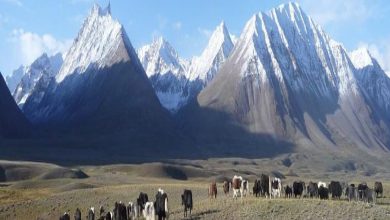Torkham Border Closure: Pakistan-Afghanistan Relations Hit New Low

Pakistan closes Torkham Border, Sparks fears of clash
Torkham, Pakistan – February 23, 2025 – The Pakistan-Afghanistan Torkham border, a vital crossing point between the two neighboring nations, has been closed by Pakistan for more than 27 hours, raising tensions and sparking concerns over a potential military confrontation. As of the latest reports, border security forces on both sides remain on high alert, with fears of an imminent clash growing.
The closure, which began at 6:55 PM on Friday, February 21, 2025, has halted all pedestrian and commercial movement, causing significant disruption to trade and daily life. Authorities on the Pakistani side have evacuated personnel from government offices, including those of the Federal Board of Revenue (FBR), Customs, Police, and the Federal Investigation Agency (FIA), relocating them to Landikotal due to security concerns.
Background of the Tensions
The closure of the Torkham border comes amid an increasingly strained relationship between Pakistan and Afghanistan. The primary issue stems from alleged border violations, with both countries accusing each other of unauthorized construction. The latest standoff reportedly began when the Taliban attempted to build a border post near Torkham, which Pakistani authorities opposed. This led to a heated dispute, however, the border officials from both sides have yet to reach a resolution.
Border clashes are not a new phenomenon between Pakistan and Afghanistan. In the past, conflicts have erupted in areas such as Shali Dara in Kunar province, Goshta district in Nangarhar, Lalpura district, and even Chitral. The Torkham standoff further exacerbates these tensions, as both sides have refused to back down from their positions.
Growing Concerns Over Military Engagement
The standoff has led to fears of a potential armed conflict. Pakistani authorities have expressed concern that any escalation could lead to a full-scale military engagement, especially given the history of border skirmishes. The situation remains volatile, with the possibility of two-sided firing increasing as each side remains heavily armed and on high alert.
In previous clashes, allegations have surfaced that Afghan forces provide cover to Tehreek-i-Taliban Pakistan (TTP) fighters, allowing them to infiltrate Pakistani territory. Pakistan has long demanded that the Afghan government take strict measures against the TTP, which has been responsible for numerous attacks inside Pakistan.
In response to ongoing security threats, Pakistan has conducted air operations inside Afghan territory. Deputy Prime Minister Ishaq Dar recently confirmed in an interview with Turkish television and PTV World that Pakistan was “forced to carry out air operations twice” to target TTP elements in Afghanistan.
Impact on Trade and Local Communities
The Torkham border closure has severely disrupted trade between the two countries. The border serves as a crucial trade route, facilitating the movement of goods, including perishable items. With hundreds of trucks stranded on both sides, traders are incurring heavy losses. Additionally, thousands of travelers have been left stranded, unable to return home or reach their destinations.
Local businesses, particularly in the border regions, have also taken a hit. The Torkham crossing is not just an economic lifeline but also a key route for cross-border movement of laborers, students, and families. Many Afghans who work in Pakistan are now unable to reach their workplaces, exacerbating their financial hardships.
Afghan Refugees and the Growing Sentiment Against Them
The situation also highlights the ongoing Afghan refugee crisis in Pakistan. With over four decades of hosting Afghan refugees, Pakistan has been facing increasing pressure against their repatriation. Various political leaders, including Afraz Siab Khattak, Aftab Ahmed Khan Sherpao, and Mohsin Dawar, have voiced concerns over the treatment of Afghan refugees, advocating for more humane policies. Some leaders argue that Afghan refugees who have lived in Pakistan for decades should be granted citizenship.
However, a growing segment of the Pakistani population is calling for the deportation of Afghan refugees, citing security and economic concerns. A social media campaign with slogans like “Go Afghani Go” reflects the rising anti-refugee sentiment. Many believe that Pakistan has done enough in terms of hospitality and that it is time for Afghan refugees to return to their homeland.
The Southern Khyber Pakhtunkhwa Crisis
While the Torkham border situation remains tense, unrest is also brewing in southern Khyber Pakhtunkhwa. In the Laki Marwat district, a large group of armed individuals, led by Inam Khan alias Goray Bhai, has been protesting for the past 12 days. The primary issue revolves around water distribution from the Baran Dam and Marwat Canal.
The protestors argue that their lands, spanning over 2 million acres, are not receiving adequate water for irrigation. The protest has escalated to the point where demonstrators have threatened to shut down gas pipelines leading to Punjab if their demands are not met. The water crisis has been exacerbated by climate change, with reports indicating that the region received 40 percent less rainfall compared to previous years.
Meanwhile, the city of Bannu is witnessing a parallel movement with the ongoing “Bannu Aman March.” The protest, which started on February 21, has seen thousands of participants demanding better governance and security. The demonstrators initially gathered at Abdul Sattar Shah Bukhari Chowk before marching towards Central Jail Bannu, where they vowed to block all entry and exit points towards the jail until their demands are met.
Negotiations between protestors and local authorities, including the military, have so far failed, further fueling tensions. The judicial complex has also been affected, with hearings and prisoner transfers being delayed due to roadblocks. Many protest leaders claim that their earlier demands have been ignored, leading to further distrust in the government.
Looking Ahead: What’s Next for Pakistan and Afghanistan?
The closure of the Torkham border is a stark reminder of the fragile relationship between Pakistan and Afghanistan. Despite cultural, historical, and religious ties, the two nations continue to struggle with deep-rooted conflicts. The current crisis calls for urgent diplomatic intervention to prevent further escalation.
A resolution at Torkham will require both countries to engage in constructive dialogue. Pakistan insists that border security must be respected, while Afghanistan demands greater cooperation in addressing mutual concerns. The role of international mediators, including the United Nations and regional powers, could be crucial in de-escalating the situation.
As tensions persist, the stakes remain high. A prolonged border closure could severely impact trade, worsen the refugee crisis, and potentially trigger violent clashes. Both Pakistan and Afghanistan must recognize that a collaborative approach is the only way to achieve lasting peace and stability in the region.
The Torkham border closure is more than just a trade dispute—it is a reflection of deeper geopolitical struggles that have plagued Pakistan and Afghanistan for decades. With military forces on high alert, growing hostility toward Afghan refugees, and economic disruptions mounting, the coming days will be critical in determining whether the region moves toward conflict or reconciliation.



